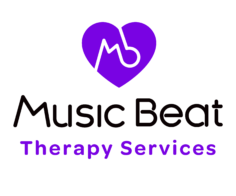Every wondered why music therapists do the things they do? Why we use music in certain ways? What we do certainly looks fun and believe me it is!!
We have the best jobs making music and helping people achieve their goals every day. But there is also a more serious side to what we do. There is a lot of science and research behind the fun ways that we make music with our clients each day.
In this blog our Registered Music Therapist (RMT) Katja Enoka explores a few of the many techniques she and other Music Beat therapists use each day, and some that you might see in a music therapy session, as well as unique ways they target important skills:
Playing instruments
Did you know the auditory cortex responsible for processing sound is linked to motor (movement) planning in the brain? This makes playing music and instruments an amazing tool for exercising different parts of the brain, working on linking movement and sound.
In fact making music is one of the few activities that involves the whole brain! Our brains also love rhythm and we can use this to help prime our brains to plan motor movements. We play a range of instruments in our sessions including the piano, ukuleles, drums, maracas and bells, castanets and other small percussion as well as larger percussion like xylophones, glockenspiels and djembes.
Recently, we talked about how several of our Music Beat Therapy RMTs underwent Neurologic Music Therapy training. They received up to date knowledge in how to use musical elements to target different movements and are utilising in their everyday practice to support their clients to achieve their goals and improve their overall wellbeing.
Singing
Singing is something most people love to do – sing along to the radio, sing in the shower, sing to our babies and rock them to sleep, sing to our children to teach them their alphabet (you know the song I am thinking here!).
Singing is also a great way to freely express ourselves, and once again our brains love the rhythmic and melodic repetition of music and we often find ourselves singing or humming without even realizing!
Singing also has several physiological benefits. This includes strengthening lung capacity which has shown to improve symptoms for people with asthma and improving deep breathing which can help reduce symptoms of anxiety. Singing also leads to increases in feel good chemicals in the brain.
When we sing our brain releases more endorphins as well as oxytocin. The act of singing also activates a range of neural pathways in the brain including language, movement and memory and triggers the release of the feel-good neurotransmitter dopamine. No wonder we love singing so much!
If you sing with others in a choir, or in your music therapy session there is even greater social benefit as we connect through the music with others.
Singing can even help with sleeping! That’s why we encourage everyone to sing, everywhere and every day. Even if others are listening.
Play list creation
Setting up a playlist with a Registered Music Therapist is a way of using music positively to support sleep, exercise, mental health, emotional regulation, and pain management.
Through careful planning and consideration, along with client led discussions and utilising their familiar music, playlists can be easily implemented and sourced. Have a think about what you listen to, and whether you engage with different playlists for different reasons!
Listening to music you love will lead to the brain releasing dopamine as well. RMTs support people in the healthy use of music in their everyday lives through playlist creations.
There are so many more music therapy techniques and activities a Registered Music Therapist uses within a session, all depending on the needs and preferences of the person. What makes music therapy so unique is that engaging in the above activities rarely feels like hard work, and it can create a natural environment for new skills to be built and developed.
These are just a few of the techniques I use each day in my work as a RMT. If you are in a session, or observing and you think “wow these guys are having so much fun, are they just playing around and having fun or doing therapeutic work?.” The answer is both!
These fun techniques that look simple and maybe even a bit silly are exercising crucial skills that can be transferred to other contexts within a person’s life (home, work, school, and the community). And they are helping them feel better every day.
Contact our Music Beat Therapy Services team to learn more about how music therapy can help you, your child, your client or organisation.

